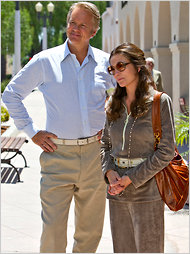Springer Berman ’85, Pulcini Direct Cinema Verite, a New HBO Film

Cinema Verite, a new film directed by Shari Springer Berman ’85 and Robert Pulcini (The Nanny Diaries, The Extra Man, American Splendor), premiered on HBO on April 23.
The film stars Diane Lane, Tim Robbins, and James Gandolfini and explores the making of the 1971 PBS 12-episode documentary series, An American Family, which chronicled the lives of “a normal American family” living in Santa Barbara, California. The series is now considered a precursor to current-day reality television shows as it invaded the privacy of the family, revealed the dissolution of a marriage, and showed an openly gay character for the first time on national television.
Indie Wire interviewed the filmmakers recently about their new movie, and Springer Berman said: “The Loud family had everything thrown at them and seemingly fell apart, but the truth is they didn’t. They actually thrived in the end. In spite of it all they’re a wonderfully close family. And there’s so much love there and they all so rallied around Lance [Loud] and were there for him through his illness and ultimately his passing. So to me it was about the triumph of family. I mean it might be a different kind of family than the ‘70s ideal was, it definitely didn’t look like The Brady Bunch, but it was a beautiful, loving family in spite of that. So that was really to me what made me excited about doing the film.”

In a discussion of the film at The New Yorker.com, film critic Richard Brody writes: “Cinema Verite belongs to a distinctive genre of film … which trades on a jolting disjunction of scale, where tiny or intimate events prove to have a vast and disproportionate historical power. The directors and the screenwriter, David Seltzer, brilliantly blend archival footage with their dramatizations; in the process, they tease out some fascinating notions regarding the very nature of documentary filmmaking and show both why the original program had such an impact back then and which kinds of great changes in society this seminal broadcast may well have sparked. The underlying subject of the film is media-consciousness itself, and Cinema Verite both reveals a moment of transition and belongs to a world in which that very consciousness risks diffusing the influence of actual decision-makers, which, here, the filmmakers restore with an ironic twist.”

